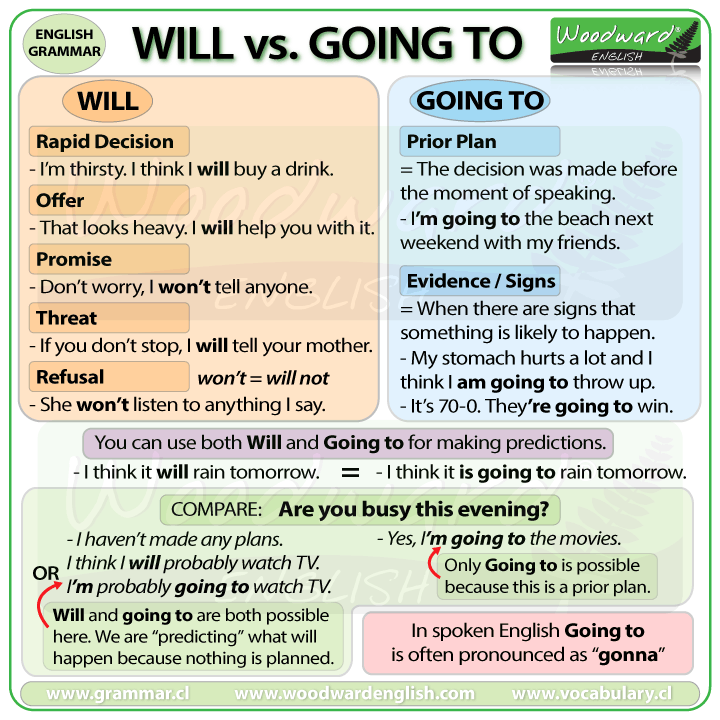Future - Will vs. Going to
English Grammar Rules
A very confusing concept is when to use WILL and when to use BE GOING TO when we refer the future.
Both refer to the future and there is a slight difference between the two though in most cases they can be used interchangeably with no difference in meaning. Even if you misuse them, a native speaker is going to understand you without any problems.
Quick Summary Chart

When to use GOING TO
The structure BE GOING TO is normally used to indicate the future but with some type of connection to the present. We use it in the following situations:
1. When we have already decided or we INTEND to do something in the future. (Prior Plan)
The decision has been made before the moment of speaking.
- They're going to retire to the beach - in fact they have already bought a little beach house.
- I'm going to accept the job offer.
2. When there are definite signs that something is going to happen. (Evidence)
Something is likely to happen based on the evidence or experience you have.
- I think it is going to rain - I just felt a drop.
- I don't feel well. I think I'm going to throw up. (throw up = vomit)
3. When something is about to happen:
- Get back! The bomb is going to explode.
When to use WILL
In other cases, where there is no implicit or explicit connection to the present, use WILL:
1. For things that we decide to do now. (Rapid Decisions)
This is when you make a decision at that moment, in a spontaneous way.
- I'll buy one for you too.
- I think I'll try one of those. (I just decided this right now)
2. When we think or believe something about the future. (Prediction)
- My team will not win the league this season.
- I think it will rain later so take an umbrella with you.
Note: You can use both Will and Going to for making future predictions.
3. To make an offer, a promise or a threat.
- I'll give you a discount if you buy it right now.
- I promise I will behave next time.
- I'll take you to the movies if you'd like.
4. You use WON'T when someone refuses to do something.
- I told him to take out the trash but he won't do it.
- My kids won't listen to anything I say.
- My car won't start.
Future Predictions
As you can see, both Will and Going to can be used for making future predictions without having a real difference in meaning.
- The weather report says it will rain tomorrow. (Correct)
- The weather report says it is going to rain tomorrow. (Correct)
Compare Will vs. Going To
If someone asks: "Are you busy this evening?"
If I respond: "Yes, I'm going to the movies." I use going to because it is a plan I made earlier (before I was asked the question). - In this case we cannot use Will.
If I haven't made plans, then you can say either: "I will probably watch TV." OR "I'm probably going to watch TV."
Both will and going to are possible in this situation because we are predicting what will happen (since we haven't made any plans).